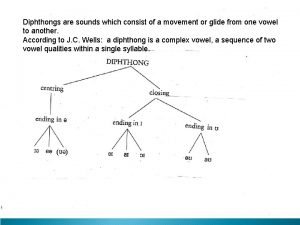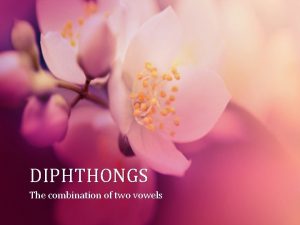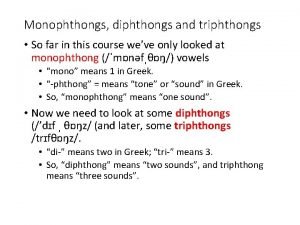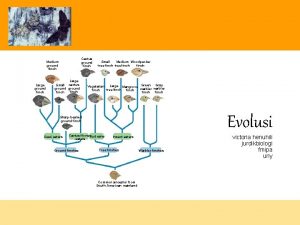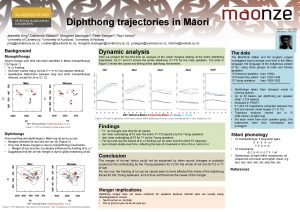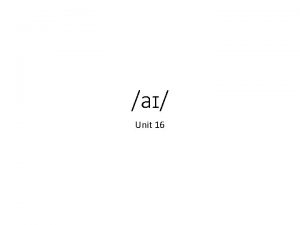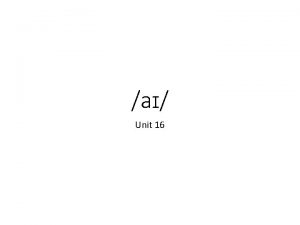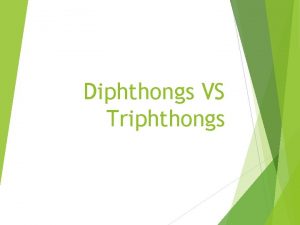According to Diana Finch a diphthong is a














- Slides: 14


According to Diana Finch, a diphthong is a vowel sound where the tongue glides from one vowel position in the direction of another, within the same syllable.

Diphthongs are sounds which consist of a movement or glide from one vowel to another. A vowel which remains constant and does not glide is called a pure vowel.



The closing diphthongs have the characteristic that they all end with a glide towards a closer vowel. Because the second part of the diphthong is weak, they often do not reach a position that could be called close. The important thing is that a glide from a relatively more open towards a relatively more close vowel is produced.

As the tongue moves closer to the roof of the mouth there is at the same time a rounding movement of the lips. This movement is not a large one, again because the second part of the diphthong is weak.


�the distance the tongue travels from one place to another: narrow/ wide �the direction of the movement: closing/ centring �the prominence of the element: falling/ rising

* Classify diphthong n° 18.


�A TRIPHTHONG IS A GLIDE FROM ONE VOWEL TO ANOTHER AND THEN TO A THIRD, THIRD ALL PRODUCED RAPIDLY AND WITHOUT INTERRUPTION.

A third vocalic element /ə/ can be added to all diphthongs except the centring ones: eɪ+ ə /eɪə/ «layer» , «player» aɪ+ ə /aɪə/ «liar» , «fire» ɔɪ+ ə /ɔɪə/ «loyal» , «royal» əʊ+ ə /əʊə/ «lower» , «mower» aʊ+ ə /aʊə / «power» , «hour» The resulting sequence, however, is pronounced fully only occasionally, as when using either a slow, formal style of pronunciation, or when the word containing the vocalic sequence is given special emphasis.

Speakers of general RP, though tend to weaken and/or omit the second element (/ɪ/ or /ʊ/) in ordinary conversational style. This vowel reduction, a form of compression, is known as «levelling» . e. g. «fire» /faɪə/ /faə/
 Diana finch
Diana finch Familias uniformadas
Familias uniformadas Y sound in greek
Y sound in greek Diphthongs
Diphthongs Centering and closing diphthongs
Centering and closing diphthongs Monophthongs, diphthongs and triphthongs
Monophthongs, diphthongs and triphthongs Gus mccrae quotes
Gus mccrae quotes Atticus finch family tree
Atticus finch family tree Shari finch
Shari finch Jvs jane and finch
Jvs jane and finch Only after food has been dried or canned
Only after food has been dried or canned Atticus finch traits
Atticus finch traits Scout finch character traits
Scout finch character traits Direct characterization of scout in to kill a mockingbird
Direct characterization of scout in to kill a mockingbird Atticus finch family tree
Atticus finch family tree



